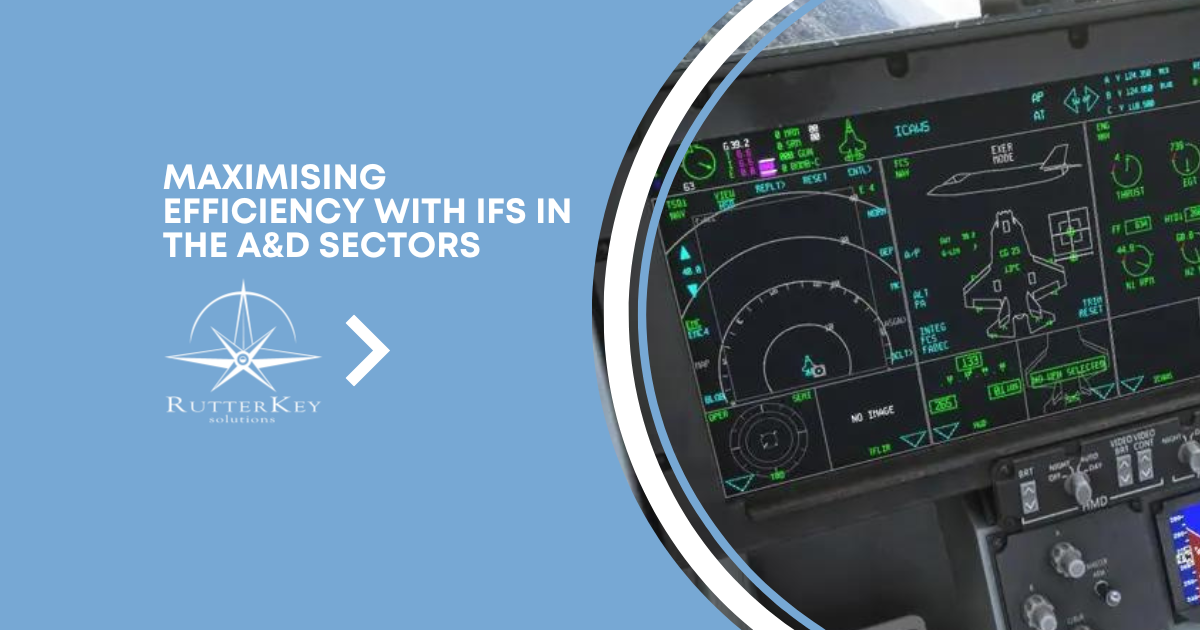
Maximising Utility with IFS Software – A Guide to Using IFS in the Utilities Sector
January 30, 2023
Maximising Efficiency with IFS in the Aerospace and Defence Sectors
February 1, 2023Enterprise Resource Planning (ERP) explained
Enterprise Resource Planning (ERP) is a business software system designed to integrate and manage the core business processes of a company. It is often used to integrate business processes across various functional areas such as finance, human resources, manufacturing, supply chain, and sales and marketing.
ERP systems are typically composed of a suite of integrated modules that are used to manage the organization's operations, such as inventory control, order management, and financial accounting. ERP systems aim to streamline business processes by providing real-time access to up-to-date data and improved decision-making capabilities.
Overview of IFS
IFS software is a suite of ERP applications designed to help businesses improve their operations and processes. It is designed for mid-sized and large enterprises and can be used to manage a range of activities including finance, sales, customer service, production, maintenance, and more.
The software offers a comprehensive set of tools and features, allowing users to streamline operations and get the most out of their resources. It also offers advanced analytics and reporting capabilities, allowing users to gain insight into their operations and make better decisions.
IFS software is designed to be easy to use and flexible, allowing users to customize the system to meet their specific needs.
5 benefits of IFS for manufacturing companies
The following list is a breakdown of some of the most commonly experienced advantages when using IFS as a manufacturing company.
1. Improved efficiency
IFS helps manufacturing companies improve operational efficiency by providing a comprehensive view of all business processes. This enables senior managers to better understand the relationships between different processes and identify potential areas for improvement.
2. Increased productivity
IFS enables manufacturing companies to optimize their processes by automating certain activities, therefore increasing productivity. Automation of certain tasks helps to reduce human errors and makes it easier to track progress.
3. Cost savings
IFS allows manufacturing companies to reduce their costs by streamlining processes and eliminating redundant tasks. This can result in significant savings in terms of time, money, and other resources.
4. Improved quality
IFS helps manufacturing companies improve quality by providing an integrated system for tracking defects and other quality-related issues. This enables managers to quickly identify and address any quality-related issues, thus improving the overall quality of their products.
5. Enhanced visibility
IFS provides a comprehensive view of all manufacturing processes, which helps managers to better understand their operations and identify areas for improvement. This can result in better decision-making and more efficient use of resources.
How IFS compares to other ERP vendors for manufacturing companies
IFS offers a strong suite of ERP solutions for manufacturing companies. It is well suited to the industry, providing features such as engineering change management, shop floor control, demand forecasting, and product lifecycle management. It also offers powerful analytics tools and an enterprise-wide data repository. IFS is a relatively low-cost solution, and its easy-to-use interface makes it simple to set up and use.
IFS stands out among other ERP vendors for its flexibility and scalability. It can easily adapt to the changing needs of a manufacturing company, allowing it to grow and evolve with the business. Additionally, IFS offers an integrated suite of applications, so companies don’t have to rely on multiple third-party solutions to manage their operations. This helps streamline processes and reduce costs.
Overall, IFS is a strong choice for manufacturing companies looking for an ERP solution that is both powerful and easy to use. It provides robust features, scalability, and cost savings, making it a great option for medium to large, multinational manufacturing businesses.
Recommendations manufacturing companies need to consider when choosing IFS
The following is a breakdown of some of the most commonly recommended actions to take when manufacturing companies are considering IFS as their ERP solution.
1. Evaluate IFS capabilities and features
Companies should assess the system’s features, architecture, scalability, and data security to ensure they meet their current and future needs.
2. Ensure the system is user-friendly for the organization
Companies should ensure IFS is easy to use and navigate for staff. This will reduce training times and ensure that users can quickly learn the system.
3. Consider the cost of IFS implementation
Companies should take into account the cost of implementation, including licensing, customization, and training.
4. Analyze IFS customer service
Companies should evaluate the vendor’s customer service, including response times and quality of service.
5. Test the system’s performance
Companies should test IFS system performance in their environment and ensure it meets their needs.
6. Consider IFS scalability
Companies should consider the scalability of IFS to ensure it meets their specific needs now and in the future.
7. Check IFS compatibility
Companies should ensure that IFS is compatible or able to be integrated with existing software and hardware where required.
8. Research the reputation of IFS
Companies should research the vendor’s reputation to ensure that they have a good track record of customer service.
Why IFS is the best ERP solution for manufacturing companies
IFS is the best ERP solution for manufacturing companies because it offers a comprehensive suite of features and tools that are tailored to the unique needs of the manufacturing industry. It helps companies streamline their operations, improve visibility into their supply chain, and manage their inventory more effectively.
Additionally, IFS provides a scalable platform that can be easily integrated with existing systems, allowing companies to leverage the latest technologies and stay agile in the ever-changing manufacturing space. Ultimately, IFS helps companies save time and money while ensuring that their operations remain efficient and effective.
Contact the RutterKey Solutions team today to discuss your specific requirements and expectations of your ERP system, whether that means implementing IFS, enhancing your existing IFS experience, or discussing a particular implementation project that requires expert support.
If you'd like to find out more about how IFS can be used in the manufacturing sector or how RutterKey can help unlock IFS' full potential in your organization, fill out the form below.


